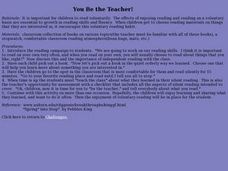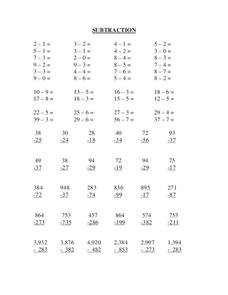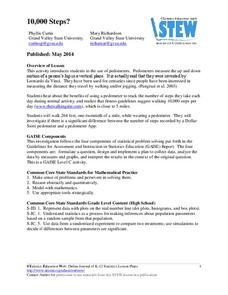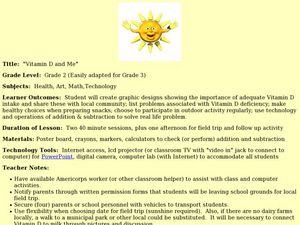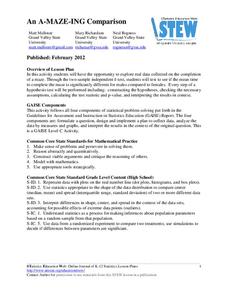Curated OER
You Be The Teacher
Young scholars create their own math problems with one restriction, the answer the teacher gives them must be kept in a sealed envelope. They may make up any kind of problem they like.
Curated OER
Subtraction Matching
Second graders solve several simple subtraction problems to find out their level of understanding. They then play a game that is like the memory game instead of finding two identical cards, they match a math problem to its answer.
Curated OER
Subtraction Equations
In this subtraction worksheet, young scholars problem solve twenty five subtraction equations as they show each step of their work as they go.
Curated OER
Subtraction Worksheet
In this elementary math worksheet, 5th graders solve problems of subtraction beginning in 2 numbers and progress to working with more complex numbers up to the thousands.
Curated OER
Stock Swaps, Variation 3
More on the fictitious takeover of the Apple Corporation by Microsoft. In this scenario, Microsoft has $28.00 per share to spare, so how many do they need to offer to make an even trade? This is an engaging problem to solve when...
Curated OER
Conditional Probability and Probability of Simultaneous Events
Your statisticians examine the characteristics of conditional probability and the probability of simultaneous independent events. They perform computer activities to find probabilities for simple compound events. They examine the...
Missouri Department of Elementary
Healthy Touches and Private Touches
Scholars identify the difference between healthy touches and private touches. A discussion leads pupils to recognize several trusting adults. Peers role-play scenarios in which they use three rules to remain safe.
Statistics Education Web
10,000 Steps?
Conduct an experiment to determine the accuracy of pedometers versus pedometer apps. Class members collect data from each device, analyze the data using a hypothesis test, and determine if there is a significant difference...
Curated OER
Vitamin D and Me
Young scholars create a graphic organizer showing the importance of Vitamin D intake. In this Vitamin D lesson, Students list problems with Vitamin D deficiency and create poster boards in small groups. Individually, young scholars will...
EngageNY
Writing and Evaluating Expressions—Multiplication and Division
Don't table the resource on writing expressions for relationships in tables. Scholars investigate relationships between variables and write algebraic expressions involving multiplication and division. These expressions help solve...
American Statistical Association
Step into Statastics
Class members study the size of classmates' feet and perform a statistical analysis of their data. They solve for central tendencies, quartiles, and spread for the entire group as well as subgroups. They then write a conclusion based on...
Curated OER
Stay Focused on Long Division
Students utilize a checklist in order to help them stay focused on long division problems.
Curated OER
Introduction to Exponents
Problem solve using exponents. Pupils read One Grain of Rice: A Mathematical Folktale and write powers to represent amounts from the story.They compare actual solutions to their predictions and play a game to practice using...
American Statistical Association
An A-MAZE-ING Comparison
Teach your class how to use descriptive statistics through a hands-on data collection activity. Pupils collect their own data, calculate test statistics, and interpret the results in context. They compare male and female results, looking...
Curated OER
Math Activity File
Third graders describe the difference between area and volume and also explain how various units of measure relate to one another.
Curated OER
As a Matter of Fact
Elementary-aged scientists discover that all matter has mass. They are shown the difference between mass and weight, and learn how to calculate mass using the appropriate tools and methods. The scientific method is used while estimating...
Curated OER
2nd Grade - Act. 17: Source Relay
Help your 2nd graders understand the difference between natural and man-made materials. They will sort breakfast food items into sources: store, factory, natural world, and farm. They will work together to classify, form conclusions, and...
EngageNY
Why Were Logarithms Developed?
Show your class how people calculated complex math problems in the old days. Scholars take a trip back to the days without calculators in the 15th installment of a 35-part module. They use logarithms to determine products of numbers and...
BBC
Starship English and Math - Online Lesson Plans
Two online lessons, one in math and one in language arts, are here for you. In them, learners play online games which reinforce important skills in literacy and numeracy. The thing I like about both of these lessons is that they get the...
Curated OER
Multiplication and Areas
Upper graders solve problems involving measurement of squares and rectangles to practice multiplication skills, finding area, and calculating prices and percentages. A performance assessment is included.
Curated OER
Jump Rope Math
Students practice grade level math skills. In this math lesson, students solve math facts on index cards and collaboratively arrange them in numerical order on a jump rope. Correct order earns the team a chance to physically move towards...
Curated OER
Temperature and Thermal Energy
Examine how heat can be transferred between systems by reconstructing a diagram on energy flow and solving problems on heat flow and work done.
Curated OER
Stochastic and Deterministic Modeling
Explore the difference between stochastic and deterministic modeling through programming. First have the class write algorithms for relatively simple tasks using pseudocode. Use the Python 2.7 program app to simulate Mendel's Pea Pod...
EngageNY
Newton’s Law of Cooling, Revisited
Does Newton's Law of Cooling have anything to do with apples? Scholars apply Newton's Law of Cooling to solve problems in the 29th installment of a 35-part module. Now that they have knowledge of logarithms, they can determine the decay...
